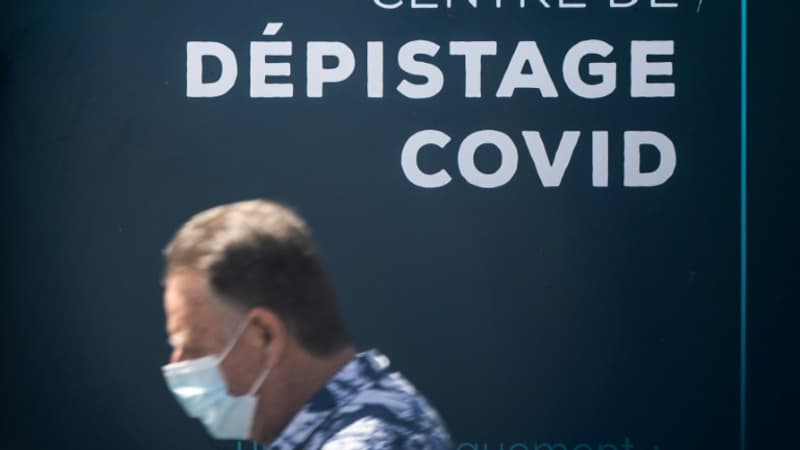Laboratories strike, insufficient screening, obsolete monitoring system… For almost a month, several factors have been disturbing the interpretation of the data relating to the monitoring of the coronavirus epidemic in France, whose eighth wave of contamination peaked in mid- October.
Despite the pause, the health authorities continue to sensitize the French about respecting isolation rules and barrier gestures. “Although the epidemic situation has been fairly calm for three weeks, one person still dies of Covid every ten minutes in France”, recalled last week the Minister of Health, François Braun, with our colleagues from the Parisian.
For his part, the government spokesman, Olivier Véran, once again recommended on BFMTV the use of a mask on public transport.
laboratories on strike
To date, the data transmitted daily by Public Health France (SPF) is not at first sight alarming. For example, 23,066 cases per day were detected on average on November 14, compared to 27,488 on November 9.
But the strike, between October 27 and November 2, by a large part of the medical biology laboratories -responsible for communicating the results of the PCR tests- had “the consequence of the interruption of the production of virological indicators”, SPF specified in its epidemiological report of November 10.
The laboratories do not agree with article 27 of the social security financing bill in 2023 for which the State asks them to pay 250 million euros per year. This is compensation for the significant turnover registered since the start of the coronavirus pandemic thanks to the numerous antigenic and PCR tests carried out.
“The fog in French health surveillance has recently thickened again with the strike movements of biologists,” Antoine Flahault, an epidemiologist and director of the Institute for Global Health at the University of Geneva, told BFMTV.com.
Because, since Monday, November 14, a new strike movement has been launched. It should last until Wednesday, November 16, but could well be renewable. Add to that the updates due to the two holidays in November, during which much less testing is done, further blurring the trends.
However, SPF defends itself and considers that “the dynamics of the antigenic tests alone (which represent more than 50% of the total tests) are highly correlated with the dynamics of all the tests”, and therefore allow a follow-up. more or less precise of the epidemic.
The vagueness around BQ.1.1 and the drop in the number of tests
However, the lack of transmission of PCR test results implies a vagueness in the analysis of the spread of Omicron subvariants in the French population. This is the case of BQ.1.1, which has been progressing for several weeks and may soon be the majority, whose SPF ratio could not be established in the tests carried out due to a “number of sequences too low to have robust ratios”.
In addition, the number of tests, in addition to laboratory strikes, also raises questions.
“It has been no longer possible in France for a few weeks to follow the evolution of the pandemic due to the collapse of the practice of PCR tests, even in hospitals”, continued Antoine Flahault.
In its weekly test monitoring report dated November 10, the Directorate of Research, Studies, Evaluation and Statistics (DREES) indicated that “the number of PCR tests validated between November 2 and 6, after these disturbances, is 24% lower than between October 19 and 23, two weeks earlier, before the riots.” Knowing that the number of tests (antigens and PCR) is already at very low levels: 106,192 tests carried out per day on average on November 11 against 216,416 on October 12 or 1,385,698 on January 15, during the strongest wave of contaminations.
A questionable system
Beyond these difficulties typical of the current period, epidemiologists criticize the French monitoring system.
“The monitoring of the tests no longer allows us to really follow the epidemic,” Dominique Costagliola, epidemiologist and research director of Inserm at IPLESP, lamented to BFMTV.com.
She is joined by Antoine Flahault. According to him, “France has not had, since the beginning of this pandemic, instruments that allow it a reliable epidemiological surveillance of Covid”.
Then he takes the example of the United Kingdom that has “know how to set up and maintain a permanent survey of its population, in which they take samples and carry out a survey that gives a more precise picture of the epidemiological situation in the country.” Or even the Netherlands and its “daily virological monitoring system by sampling wastewater from 350 treatment plants spread throughout its territory.”
The epidemiologist then praised their “intensive sequencing strategy for the identified viruses that allows them to map the evolution of the variants in their territory in almost real time” while France “sinks into an increasingly thick fog.”
Source: BFM TV


